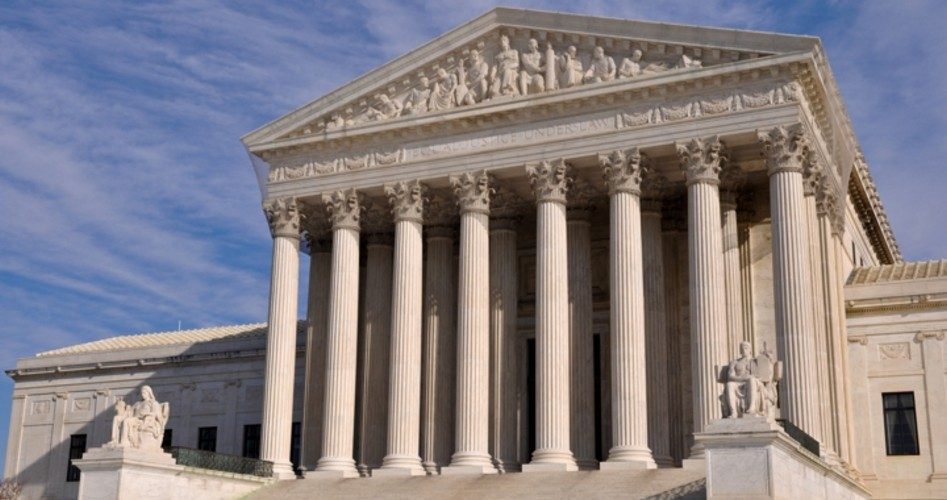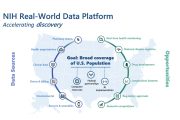
The political class likes to pretend that Supreme Court decisions are based strictly on constitutional considerations, not politics; that’s why justices have lifetime appointments, after all. But a leaked e-mail from a Hillary Clinton ally shows that the Left, at least, has no qualms about employing political threats to influence the court.
In 2015 the court heard arguments in the case of King v. Burwell. Plaintiffs in the case argued that the plain language of the Affordable Care Act (ACA) indicated that subsidies for the purchase of health insurance were available only to those buying coverage on state exchanges, not the federal exchange. The Obama administration, however, had chosen to extend subsidies to those enrolling on the federal exchange because hardly any states had set up their own exchanges, and without the subsidies few people would be able to afford ACA-compliant insurance, bringing about an immediate collapse of ObamaCare.
On June 2, 2015, while the justices were deliberating their decision, Neera Tanden, president of the left-wing Center for American Progress (CAP), sent an e-mail to staffers on Clinton’s ill-fated presidential campaign suggesting that Clinton threaten to make the Supreme Court a campaign issue should the court rule in favor of the plaintiffs. Among the staffers receiving the e-mail were communications director Jennifer Palmieri and campaign chairman John Podesta; the e-mail was included among the numerous Podesta e-mails released by WikiLeaks.
“It is most likely that this decision has already been made by the Court, but on the off chance that history is repeating itself, then it’s possible they are still deciding (last time, seems like [Chief Justice John] Roberts went from striking the mandate to supporting it in the weeks before),” Tanden wrote. “As Jennifer will remember, it was pretty critical that the President threw the gauntlet down last time on the Court, warning them in the first case that it would politicize the role of the Court for them to rule against the ACA. As a close reader of the case, I honestly believe that was vital to scaring Roberts off.”
Tanden’s analysis of Roberts’ about-face on ObamaCare referred to the 2012 case of National Federation of Independent Business v. Sebelius, which challenged various aspects of the ACA, including the individual mandate. With the remaining justices evenly divided on whether to strike down or uphold the law, Roberts would cast the deciding vote. Initially it appeared that he was going to vote to overturn the individual mandate if not the entire law. Then Democrats and their media allies swung into action.
According to CBS News:
There were countless news articles in May warning of damage to the court — and to Roberts’ reputation — if the court were to strike down the mandate. Leading politicians, including the president himself, had expressed confidence the mandate would be upheld. Some even suggested that if Roberts struck down the mandate, it would prove he had been deceitful during his confirmation hearings, when he explained a philosophy of judicial restraint.
President Barack Obama argued that if an “unelected group of people” took “what would be an unprecedented, extraordinary step of overturning a law that was passed by a strong majority of a democratically elected Congress,” it would amount to judicial activism at its worst. Former President Bill Clinton claimed that a victory for the plaintiffs would lead to a Republican rout in the midterm elections. And Senator Patrick Leahy (D-Vt.), then chairman of the Senate Judiciary Committee, gave a floor speech in which he said, “I trust that he [Roberts] will be a chief justice for all of us and that he has a strong institutional sense of the proper role of the judicial branch. The conservative activism of recent years has not been good for the court.”
In the end, Roberts reversed himself and ruled for the government. Tanden clearly believed that political pressure played a significant role in “scaring Roberts off” his initial, constitutionally sound position. Thus, she suggested, the Clinton campaign and its allies should bring the same kind of pressure to bear on the court as it decided King:
In this case, I’m not arguing that Hillary spend a lot of time attacking the Court. I do think it would be very helpful to all of our interest in a decision affirming the law, for Roberts and perhaps [Justice Anthony] Kennedy to see negative political consequences to ruling against the government.
Therefore, I think it would be helpful to have a story of how progressives and Hillary would make the Supreme Court an election issue (which would be a ready argument for liberals) if the Court rules against the government. It’s not that you wish that happens. But that would be the necessary consequence of a negative decision … the Court itself would become a hugely important political issue.
Tanden said the CAP could “get that story started” but would need the campaign to “make it stick.”
Staffers responded to Tanden’s recommendations with general agreement and noted that Clinton had already been saying such things, though her remarks seem not to have made much news.
Obama, on the other hand, went on the attack again. The president said the case “probably shouldn’t even have been taken up” by the Supreme Court and that a decision prohibiting subsidies on the federal exchange was “not something that should be done based on a twisted interpretation of four words.”
“It seems so cynical to want to take coverage away from millions of people, to take care away from the people who need it the most, to punish millions with higher costs of care and unravel what’s now been woven into the fabric of America,” Obama added.
Once more, Roberts — this time joined by Kennedy, who had ruled against ObamaCare in 2012 — joined his liberal colleagues in accepting the government’s arguments, specifically that “exchange established by the state” means “exchange established by the state or the federal government.” The late Justice Antonin Scalia, in his dissent, labeled that reasoning “quite absurd.”
Did Obama, Clinton, and other “progressives” manage to scare Roberts into standing by ObamaCare yet again? We may never know. But we do know this: While Democrats were publicly warning the Supreme Court against issuing politicized rulings, they privately schemed to politicize the court’s decision-making process, thereby rescuing the patently unconstitutional and unworkable ACA from otherwise certain extinction.





